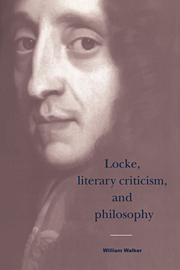Book contents
- Frontmatter
- Contents
- Preface
- Acknowledgements
- Note on the text
- Part I Introduction
- Part II Mind
- 2 Substance, space, labor, and property
- 3 Acquaintance
- 4 Seeing and touching
- 5 Force
- Part III Trope
- Part IV Conclusion
- Appendix
- Select bibliography
- Index
- Cambridge Studies in Eighteenth-Century English Literature and Thought
- Frontmatter
- Contents
- Preface
- Acknowledgements
- Note on the text
- Part I Introduction
- Part II Mind
- 2 Substance, space, labor, and property
- 3 Acquaintance
- 4 Seeing and touching
- 5 Force
- Part III Trope
- Part IV Conclusion
- Appendix
- Select bibliography
- Index
- Cambridge Studies in Eighteenth-Century English Literature and Thought
Summary
We'll follow the new Mode which they begin,
And treat 'em with a Room, and Couch within.
Dryden, Marriage à la ModeIt has so far been observed that, within the context of the polemic against innatism, Locke is remarkably consistent in substituting an enclosed space for an imprinted substance as his figuration of the mental scene. This substitution works to displace God (and Nature) as the origin of ideas. For God as pre-natal imprinter is, in the Essay, the predominant corollary of the explicit description of the mind as an imprinted substance which Locke attributes to his innatist opponents. To eliminate the notion of the mind as an imprinted substance is to eliminate the notion of God as its pre-experiential and direct imprinter. This dimension of Locke's discourse of mind is hence an instance of the secularization that several literary critics understand to dominate Restoration and eighteenth-century thinking and writing. Besides helping to displace God as the imprinter, author, and origin of ideas and knowledge, spatial discourse coheres with another vocabulary Locke uses to establish experience (sensation and reflection) as the ground of knowledge. This is the political/economic vocabulary that also constitutes Two Treatises of Government. Locke does not, as Thomas Weiskel claims, empty out the soul and thereby establish both the vacant soul of eighteenth-century accounts of the natural sublime and the “inner space, the infinitude of the Romantic mind which is born as a massive and more or less unconscious emptiness, an absence.”
- Type
- Chapter
- Information
- Locke, Literary Criticism, and Philosophy , pp. 55 - 72Publisher: Cambridge University PressPrint publication year: 1994

